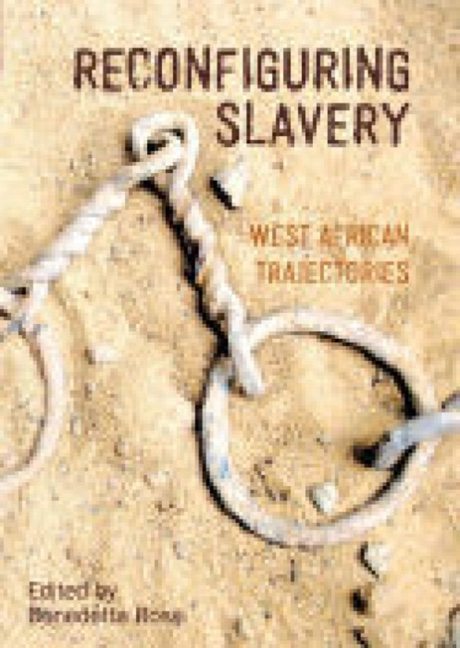Book contents
- Frontmatter
- Content
- List of Figures
- Notes on Contributors
- Preface
- A Note on Language
- Preface to the Second Edition
- 1 Introduction: Rethinking Slavery in West Africa
- 2 Slave Descent and Social Status in Sahara and Sudan
- 3 African American Psychologists, the Atlantic Slave Trade and Ghana: A History of the Present
- 4 After Abolition: Metaphors of Slavery in the Political History of the Gambia
- 5 Islamic Patronage and Republican Emancipation: The Slaves of the Almaami in the Senegal River Valley
- 6 Curse and Blessing: On Post-slavery Modes of Perception and Agency in Benin
- 7 Contemporary Trajectories of Slavery in Haalpulaar Society (Mauritania)
- 8 Slavery and Politics: Stigma, Decentralisation and Political Representation in Niger and Benin
- 9 Slavery and Migration: Social and Physical Mobility in Ader (Niger)
- 10 Discourses on Slavery: Reflections on Forty Years of Research
- Glossary of Foreign Words
- Index
9 - Slavery and Migration: Social and Physical Mobility in Ader (Niger)
- Frontmatter
- Content
- List of Figures
- Notes on Contributors
- Preface
- A Note on Language
- Preface to the Second Edition
- 1 Introduction: Rethinking Slavery in West Africa
- 2 Slave Descent and Social Status in Sahara and Sudan
- 3 African American Psychologists, the Atlantic Slave Trade and Ghana: A History of the Present
- 4 After Abolition: Metaphors of Slavery in the Political History of the Gambia
- 5 Islamic Patronage and Republican Emancipation: The Slaves of the Almaami in the Senegal River Valley
- 6 Curse and Blessing: On Post-slavery Modes of Perception and Agency in Benin
- 7 Contemporary Trajectories of Slavery in Haalpulaar Society (Mauritania)
- 8 Slavery and Politics: Stigma, Decentralisation and Political Representation in Niger and Benin
- 9 Slavery and Migration: Social and Physical Mobility in Ader (Niger)
- 10 Discourses on Slavery: Reflections on Forty Years of Research
- Glossary of Foreign Words
- Index
Summary
Tafiya ta fi zama
Travelling is better than staying still
(Hausa proverb of Ader)One of the ways in which hierarchy was, and still is, expressed in the Ader region of the Republic of Niger is in terms of relative control over one's own and other people's mobility. In contexts where movement, rather than a settled lifestyle, is a habitual state, ‘how one moves’ constitutes a critical dimension of ‘who one is’. An emphasis on mobility in the constitution of identity means that power manifests itself as relative control over one's own and other people's movements. The restructuring of relations of governance and production induced by colonialism did not, in spite of colonial efforts in this sense, lead to population settlement, but it redirected the axes of control over people's mobility. The elites, who practised transhumance and asserted their freedom to move through war, saw their mobility curtailed and controlled by colonial administrators. People of slave status, whose movements had been tied to the will of their masters, followed different patterns. Until the 1940s some ex-slaves were employed in compulsory labour. Others, having gained independence from their former masters, started migrating to northern Nigeria, seasonally or permanently.
Throughout the nineteenth century slave labour was embedded in transhumance and long-distance trade. In northern Ader, in areas bordering the desert, hamlets of semi-sedentary servile groups farmed lands and tended livestock that belonged to their masters, functioning as a reservoir of labour, cereals and animals for Tuareg masters leading nomadic lifestyles. The mobility of various subordinate groups was a dependent mobility, constrained by the mobility of elites and freemen. The masters’ yearly trajectories gave rise to patterns of crossed mobilities, the elite's movements generating a set of subordinate movements. Dependent persons were not free to choose when and how to move. While the latter's movements were not physically restrained, the semi-desert habitat that surrounded them, the military superiority of the masters and the regional legitimacy of the imajeghen 's rule made escape difficult and rare in the nineteenth century.
In the early 1900s Tuareg elites were defeated by the French and progressively lost control over people and camels, their main forms of wealth.
- Type
- Chapter
- Information
- Reconfiguring SlaveryWest African Trajectories, pp. 182 - 206Publisher: Liverpool University PressPrint publication year: 2009



